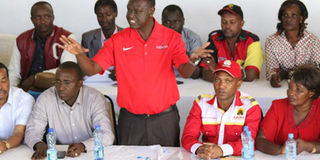Party primaries should be clean but public officers must keep off

Meru Senator Kiraitu Murungi addresses the county's Jubilee Party aspirants at Thiiri Centre on January 14, 2017. Media should ensure that political parties uphold the Electoral Code of Conduct during their nominations. PHOTO | PHOEBE OKALL | NATION MEDIA GROUP
What you need to know:
- The use of public resources to conduct the party nominations cannot be justified at all.
- Political parties, a number of which currently receive public funding, must be monitored and forced to abide by the law.
As the political party primaries begin on Monday across the country in preparation for the August 8 General Election, media and other concerned public agencies should be monitoring a number of things, including the misuse of public resources and the involvement of state officers.
Election campaigns are not official government business. Therefore, the use of public resources to conduct the party nominations cannot be justified at all.
Media and other agencies must monitor, document and highlight such events with a view to having the culprits prosecuted.
This is because using public resources in political party campaigns constitutes a blatant misuse of our scarce public resources.
Public officers must remain non-partisan in the electoral process.
They must not engage in political activity either through acts that could compromise their neutrality or by acting as agents of parties.
Much as the courts suspended the Chief of Staff’s memo on Section 45 (3) of the Elections Act 2011 that had required public officers interested in participating in elective politics to vacate offices several months before the campaign period begins, Section 16 (1) of the Public Officer Ethics Act prohibits public officers from participating in partisan politics.
Officers incurring expenses, including per diems, travel costs and other related expenses to involve themselves in political party activities must be surcharged.
OBEDIENCE TO LAW
Media and other institutions, including the Commission for Administration of Justice, Kenya National Commission on Human Rights, Teachers Service Commission, National Police Service Commission and others, must be vigilant and expose the culprits.
This constitutes abuse of public office and the Public Service Commission has clear guidelines on such breaches.
Political parties, a number of which currently receive public funding, must be monitored and forced to abide by the law.
Political parties must respect the democratic choices of their party supporters during the nominations and avoid imposing candidates on the electorate.
As already seen, most of the violence being witnessed is associated with the political activities that are likely to heighten during the nominations, mainly because of voters resisting the imposition of unpopular candidates on them.
Media should ensure that political parties uphold the Electoral Code of Conduct during their nominations.
Media exposure of parties violating the law must be followed up by action by the IEBC, which if cases are proved should punish the parties and/or candidates violating the legal requirements of the Code of Conduct during nominations.
There is a lot of confusion in the political arena and we are likely to see the same individuals and parties dominate both the county and national systems.
The failure to strictly implement the Political Parties Act has undermined the ability to instil discipline in the politicians to bring sanity to the political/economic arena in the country.
HANDOUT CULTURE
We have parties that operate like personal fiefdoms of certain founding politicians.
As it stands now, politics in Kenya tends to be dictated by those who fund the ruling party to enable it to retain leadership.
This has created a situation where those who come into power serve the interests of their funders and hence political accountability is to those who finance the parties and not to the citizens.
On the other hand, a strong culture of handouts has arisen. This has narrowed the political space.
Kenyans need to be educated on how political parties will be required to fill the various positions created under the Constitution to meet the threshold to nominate.
How will parties run nominations or are we going to see the same thing — party owners and funders handpicking their cronies to all positions?
Mr Bwire is the deputy chief executive officer of the Media Council of Kenya. [email protected]




